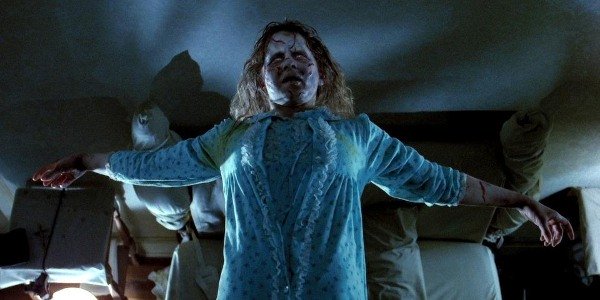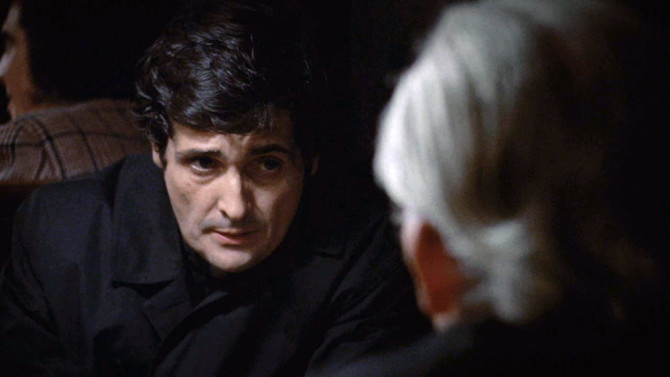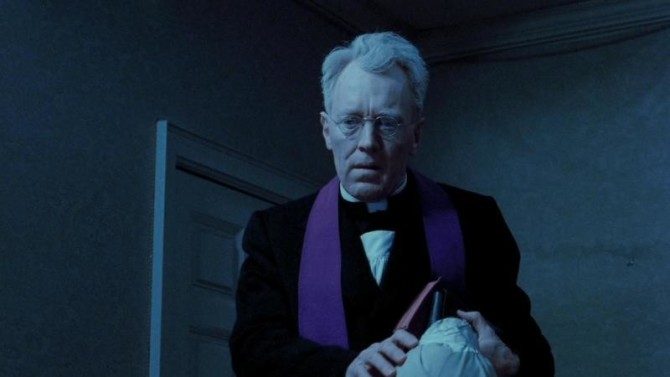I’m about to get weird. But it’s Halloween and on Halloween you’re allowed to get weird. You see, Halloween is responsible for my most brutal craving, a craving that has followed me deep into my adult life – that of the Reeses Peanut Butter cup. Due to those single little orange squares of demonary, I have a lifetime addiction I’m battling.
But anyone who knows Reeses Peanut Butter Cups knows that there’s a big difference between a good Reeses Peanut Butter Cup and a bad one. A good Reeses Peanut Butter Cup has a shiny crisp hard layer of chocolate on the outside, and a mushy delicious peanut butter filling on the inside. Unfortunately, the delicious versions of this perfect feat of finger-licking engineering can only be found sporadically. They’re like rare pokemen.
You’re far more likely to receive the bad version of the Reeses Peanut Butter Cup. These will have no shine on the chocolate, but rather a muddy grayish-brown texture with softened edges. This is due to the cup melting, un-melting, melting, and un-melting over time. And don’t even get me started on the inside, which is hard and chalky. Opening a Reeses package and finding these cups is one of life’s greatest disappointments.
So what is a Reeses Peanut Butter lover to do? Well, I’ve found a trick, a crack in the system, which allows one to determine if the package is that fresh delicious ideal version of the cup or its sad muddy depressing cousin.
Now pay attention.
On the back of every package is a date. That is the “best by” date. Now you’re going to need a degree in Dynamical systems and differential equations to understand the next step. So if calculus eluded you, turn away now. I can’t help you. The “best by” date on the back of the package must be 7 months or more ahead of the current date in which you are residing. That difference in dates denotes a brand new Reeses Peanut Butter cup. You can take your chances with six months or five months. But I wouldn’t. It’s too risky. Only that seven months or beyond date is confirmation that you have a great Reeses Peanut Butter Cup on your hands, which you will be able to buy with complete confidence that your impending meal will be a great one.
You’re welcome.
Reeses Peanut Butter Cups are doing double-duty today as they’ve also inspired this article. We’re going to play a little Trick or Treat with the best horror movies of the decade. I combed through the most financially and critically successful horror films of the last ten years and looked for examples of what to do (treat) and not to do (trick). Let’s take a look.
A Quiet Place
Treat: A high concept horror hook is gold. But one that allows you to explore horror in a completely new way is platinum. The concept of not being able to make a sound or you’re dead within seconds may be the most clever idea of the decade. It allows for a silent horror film, something that audiences had not seen for decades. Which is why the film made 180 million dollars on a 17 million dollar budget.
Trick: You have to iron out the holes in your concept. If you don’t, you’re going to lose some of your audience. The reason so many people came out of A Quiet Place angry is because they’d didn’t buy into the concept (what happens if you sneeze or fall? And why don’t they all live by the waterfall, which drowns out sound?). It’s up to the writer to eliminate all those wrinkles so nobody’s disbelief is suspended.
Get Out
Treat: Get Out began the social commentary horror genre. I expect this trend to be around for at least another five years, so take advantage of it. It’s a volatile ground (poor “The Hunt” found this out the hard way). But one thing is for sure – these scripts are rising to the top of producer’s must-read lists. Social Commentary + Horror is a goldmine!
Trick: There ain’t much wrong with Get Out so I’ll give you a couple of small tricks. Do NOT denote something weird going on with a character by having their nose inadvertently bleed. That has been done in 7032 horror movies to date. And don’t, when your characters are driving somewhere, have them hit, or almost hit, a deer. This scene is so common in the horror scripts I read, the only question I have is what page it will occur on.
It Follows
Treat: As was the case with A Quiet Place, simple concepts with few rules work well in horror. A person only you can see follows you, trying to kill you, until you pass the curse on to the next person by sleeping with them. Heck, the whole concept is right there in the title. Nice!
Trick: Don’t break the rules you’ve set up, no matter how difficult that makes the writing or how much it improves your set pieces. Courtesy of Tarantino, he points out that throughout this whole movie, these things had one M.O.: come at you and try to kill you. Yet in the finale, which occurs in a pool, they’re throwing things at their target? Strategizing? That’s never happened before. Stay consistent! Or if you’re going to change the rules, make sure you’ve properly set the changes up earlier in the story.
Hereditary
Treat: There’s no more important genre than horror where you must make it clear to the audience that THEY’RE NOT SAFE. If an audience feels safe during a horror movie, YOU’VE FAILED. So give them one horrible incident in the first 45 pages of your script that they never saw coming in a million years. Nobody would ever expect the writer to kill off the mentally challenged daughter in the family because it’s never been done before! So Ari Hester does just that… in the most horrifying way possible. Is there a single audience member who has any idea what to expect after that scene? No. Moving forward, nothing is sacred, nothing is safe. And that’s right where you want your audience.
Trick: Horror scripts remain some of the sloppiest I read. That’s because writers (especially younger writers) think it’s all about the scares. They don’t care if things make sense. They don’t care about carefully setting a story up, building it throughout the second act, and paying it all off at the end in an intelligent way. As long as they get to include that scene where a character gets operated on in a basement hospital while they’re awake, they’re happy. Hereditary could’ve been great if the narrative weren’t so sloppy.
Let The Right One In
Treat: Horror is the perfect genre for the taboo, the yucky stuff we’re not supposed to talk about in society. It’s the very reason we’re not allowed to talk about it that makes audiences so curious when they see it. Let the Right One In introduces us to a 55 year old man in a relationship with a 12 year-old “girl.” Of course, that’s not exactly what’s going on. And there are more taboo topics revealed as the story unwinds. But if you can think of something that’s icky/disgusting/weird/taboo, it might be the perfect subject matter for a horror script.
Trick: Playing with the following tip is like playing with fire. You’ve been warned. “Imply” instead of “tell” to create a more powerful impact. In the book this film was based on, pedophilia is a primary theme, portrayed through Hakan, the 55 year-old “keeper” and Eli, his child vampire’s, relationship. But in the screenplay, it is never stated that they are with one another, leaving their relationship up to interpretation. The reason this is such a powerful trick is because it allows the reader to feel like they’ve figured it out on their own. That’s always more satisfying than being straight up told. But be careful. If you’re too vague and there’s no implication at all what’s going on, the reader might not catch what you’re selling.
IT
Treat: Every horror script should have at least one set piece scene that revolves around an impending sense of doom that the audience knows the character isn’t going to get out of (they can still get out of it, but the important thing is that the audience believes they won’t). The early scene in “IT” where a young child encounters a curious clown in the sewer is so good it became the poster. Just remember that newbie writers will speed through this scene. Veteran writers know that these precious perfect moments of tension need to be milked for as long as possible. Make them one of your horror script’s long set pieces.
Trick: Choose characters that the antagonist has a significant advantage over. The bigger the gap between the villain’s strength and the heroes’ strength, the better. IT’s success had a lot to do with the main characters being children. Children are helpless against a powerful monster. One of the reasons we didn’t feel nearly as scared in the sequel is because they were now adults. The gap in strength had lessened considerably.
The Conjuring
Treat: Something that works really well in horror films is children’s games turned deadly/scary. I don’t know why. Maybe it’s the contrast between something that’s supposed to be fun being deadly, but a well-constructed child’s game sequence in a horror film can work wonders. It worked so well for The Conjuring that they built the entire first trailer around it. There was also that script that recently sold about kids’ games in a haunted house. Just make sure that you don’t use something common! Find a game or an angle on a game that hasn’t been done before.
Feel free to take another treat from the basket: The power of proper Point of View. Producer Tony DeRosa-Grund wrote a treatment for The Conjuring which he tried to sell for 14 years unsuccessfully. He finally gave the idea over to brothers Chad and Carey Hayes, who changed the narrative’s driving point-of-view from the family who’d moved into the house to the Warrens (the ghost investigators). This change in POV helped contribute to a six studio bidding war. Are the characters in your current script the best point of view for the story? You owe it to yourself to imagine your story with as many other points-of-view as possible before coming to that conclusion.
Look out for razor blades in your candy and don’t stay out too late! Oh, and share your favorite Halloween candy in the comments!
Halloween Week continues on with the highest horror concept we’ve seen all year. But is it too much for the writer to handle??
Genre: Horror – 1 Hour TV Pilot
Premise: (from Blood List) A controversial high tech company pays the dying to keep their spirits alive in their homes after they pass so they can market these ‘haunted houses’ to high-paying visitors (think haunted Airbnb). Heathcliff Gill is a recruiter for the company who begins to realize the immortality he’s selling isn’t as blissful as he thought.
About: This pilot finished on the 2017 Blood List.
Writer: Tim Macy
Details: 62 pages

You know what I miss most about the old spec days? The fun ideas. The creative interesting fun concepts that people used to come up with. You’d have your Jurassic Parks and Con Airs, a new time-travel spec sale every week. Nowadays, you’ll be lucky if you see a handful of those a year. You’re more likely to sell a biopic about the guy who invented the clock than the next Terminator.
So when I see concepts like this one, I smile. How do you get more high-concept than “Haunted Airbnb?” And TV seems to be where these ideas are going right now. Between shows like Russian Doll and Living with Myself, TV is ironically embracing something they used to hate – the high concept pitch.
But the challenge with high concept ideas remains the same. There’s a threshold for how far you can push a concept before the audience doesn’t buy it. “Cowboys and Aliens” for example. People looked at that and said, “Uh-uh.” Today’s pilot walks that line so precipitously, that you think it’s going to fall at any minute. Yet somehow, some way, it makes it all the way to the other side of the canyon.
Heathcliff is a recruiter for a company called Entity. Entity has figured out how to scientifically capture the soul of a human as they pass away. Seeing as this is America, they then went about monetizing the idea.
If you’re going to die soon, you can sign up with Entity and they will capture your soul and keep it in your home forever. Why would anyone do this? Because people will pay big bucks to stay in houses with ghosts in them. And the family will get a cut of these profits for as long as they’re alive. So if Walter White had existed now instead of ten years ago, he may have chosen this to help his family as opposed to making meth.
Entity has fought numerous lawsuits to keep this process proprietary. Even the government doesn’t know how they do it. The rules are that you rent a house for a day and get to experience real live ghosts. No phones, no cameras, no video recorders. You can’t tape anything inside these houses.
Naturally, there are a lot of people who don’t like what Entity does. There is an ongoing 365 day protest in front of their headquarters, telling them to stop stealing Heaven from these individuals. So Heathcliff has to be careful about who he reveals his profession to. If he’s in the wrong part of town with someone who doesn’t like Entity, he could be in deep trouble.
The pilot focuses mostly on Heathcliff battling for “employee of the year” with his recruiter nemesis in the company. Time is running out and whoever can recruit one more individual by the end of the month is going to win. Which is why Heathcliff isn’t as meticulous as he normally is when a middle-aged gentleman named Alfred Kind contacts him and says he wants in.
Heathcliff speeds through the normally elaborate process, and therefore misses a key detail. That Alfred Kind isn’t sick at all. He’s duping the system, covertly committing suicide. But why? We find out later in the episode when the now dead Alfred spirit receives his first “Haunted Airbnb” customers. As soon as he has them in his house, he proceeds to murder them. End of episode.
Okay okay.
I can already hear what you guys are saying.
This is a totally ludicrous idea! Carson, are you insane? Have you lost it?
Maybe.
To be honest, these pages got a lot ‘come on, really?’ looks from me. The government wouldn’t have any oversight on a company that kept human souls alive? The person’s family has to leave the house and can never come back and see their loved one’s soul again? Not even for a day?? If you sign up for an experience, they lock all the doors from the outside so you’re stuck there til morning? I mean come on. There isn’t a Fire Marshall in the whole of the United States who would okay that one.
Heres’ the problem Heartbeat runs into. And it’s a problem I see quite often in screenplays. When you’re creating your mythology, the more rules you have to put in place for it to make sense, the more spots there are for the logic to fall apart. This is why I tell everyone to MAKE YOUR RULES AS SIMPLE AS POSSIBLE. The more convoluted your rule-set gets, the more holes there are springing leaks.
Heartbeat has to spend its first 15 pages (one scene with Heathcliff trying to sign up a family and one scene where the president of the company is answering questions from the press) on exposition. That’s a good sign that your rule-set is too complicated.
However, there is an addendum to this. And it’s the same thing that occurred in The Matrix (**this is a Scriptshadow warning – Matrix reference incoming – you have been warned**). If the exposition is exposing something interesting, people will allow it. The Matrix has 20+ pages of exposition about The Matrix and yet it’s all so cool, we don’t care. Heartbeat is no Matrix. But I was oddly mesmerized by this idea that people were selling their souls, literally, to become ghosts. Even when the logic became outlandish, I still liked the core idea.
And the most important thing is that I wanted to keep reading. Remember, that’s all that matters in the end. With any script. If the reader wants to keep reading, you’re winning. Specifically, I knew Entity was doing something shady and I wanted to figure out what it was. And I knew that Alfred had something up his sleeve and I wanted to find out what that was. Those two threads combined with the unique premise kept me engaged.
My next question was, is this a TV show? Does it have the longevity to be extended out over a number of seasons? I don’t see how it does. I can see a thread where Heathcliff learns that the company is lying and doing something nefarious (my guess is that they’re picking people ahead of time and working with doctors to give them fake terminal diagnoses) but once that’s revealed, where do you go?
This goes back to the difference between how you approach a feature compared to how you approach a pilot. With a feature, you will almost always start with plot. With a pilot, you should start with character. Specifically MULTIPLE CHARACTERS. You do this so that 5-8 characters in your pilot begin this journey with unresolved problems. That way, when someone finishes reading the pilot, they’ve got the unresolved plot to imagine going forward, and they’ve got 8 unresolved character journeys to imagine as well. This helps someone believe that a pilot can last for lots of episodes.
In Heartbeat, the only person we truly get to know is Heathcliff. And then Arthur, sort of. That’s 1 and a half characters. So, naturally, when I try and imagine future episodes, I don’t have much to imagine. That’s a big thing when producers and networks read a pilot. They need to be able to imagine future episodes.
Now, of course, the length of TV shows has a lot more flexibility these days. But most people are still looking for that lucrative multi-season show because those are the shows that make the most money. And Heartbeat doesn’t feel like that.
With that said, it’s a fun concept and a fun read. I blew through this fast and still cared at the end. That says a lot about a script and why I think it’s worth checking out.
[ ] What the hell did I just read?
[ ] wasn’t for me
[x] worth the read
[ ] impressive
[ ] genius
What I learned: Unless you’re writing one of these 6 episode – 1 season streaming shows, you shouldn’t focus your story around a single character in a TV Pilot. You’re better off cutting between a full cast of characters. This will give your pilot the meat necessary to convey a long-running series.
Currently one of the best writers in town, Taylor Sheridan is back with another spec that’s expected to start a major franchise.
Genre: ACTION/CRIME
Premise: A former delta force operator is given a unique opportunity by the DEA to take down drug dealers without any oversight.
About: Can life get any better for Tyler Sheridan? The writer of Hell or High Water, Sicario, and Sicario 2, as well as writer-director of Wind River, recently moved into TV, where he took a project that wasn’t on anyone’s radar, Yellowstone, and turned it into a surprise hit. F.A.S.T doesn’t seem to be following the same narrative, unfortunately. Sheridan was in negotiations to direct it with Chris Pratt attached to star, but those negotiations broke down and the studio brought Gavin O’Connor onto the project. Since that point, it’s unclear if Pratt remains on F.A.S.T. But a new Sheridan spec is always a big deal so I’m excited to find out about it today.
Writer: Taylor Sheridan
Details: 132 pages
I think Taylor Sheridan is one of the best writing successes of the last five years. There are hundreds of thousands of fellow actors writing screenplays. He rose above them all by putting emphasis on the things he knew best – character development and modernizing old-fashioned subject matter like cops and robbers.
The way breaking in works is that you go at screenwriting for a while until you finally write something that people like. Then everyone in Hollywood wants to work with you. Because you’ve been at this for so long, you have 2-3 scripts in the hopper that are almost there. These scripts allow you to keep the momentum going.
But once you get past those scripts, you’re writing from scratch. Now, theoretically, you’re a better writer so you should be able to write a good script faster. But the reality about screenwriting is that you need drafts. No matter how good you are, it takes half-a-dozen drafts before you even start to find your story. This is what famously happened during the writing of The Sixth Sense. That script started off about a boy who drew spooky images about a killer and ended up being about a kid who saw dead people and the psychologist who helped him.
All this is to say that the well appears to be drying up for Sheridan. His first couple of scripts were great. But Sicario 2 was a narrative mess. It was the first script where I thought, “He’s rushing this.” And I’m not mad. Look, you don’t know when the Hollywood truck of money no longer wants to pay you a visit. So you have to capitalize when you’re hot. But I’m worried that Sherdian may be biting more than he can chew. Let’s hope I’m wrong.
Kyle is a former delta force operator in the Middle East. But ever since he’s been back in Baltimore, he can barely make ends meet. His wife and two kids are tired of living in a garbage tract house. If something doesn’t change soon, he’s not sure he’ll be able to keep it together.
One day while bringing his kids home from school, Kyle spots two skinheads – who live on his block no less – carrying his TV and furniture back to their house. Kyle has his kids wait at home then goes over to get his effing stuff back. As often happens with skinheads, things escalate, and within seconds, Kyle’s killed both of them.
Kyle calls his old commander, Sheel, who now works for the DEA, and Sheel comes over to help him clean up the mess. They learn that the skinheads were drug dealers in the area. In a roundabout way, they just helped the community.
This gives Sheel an idea. You see, it’s impossible to get anything done at the DEA. There’s a thousand miles of politics and red tape. So what if you just… didn’t have to worry about that? In the Middle East, the CIA used to run a program called “F.A.S.T.” that didn’t have any laws. If you wanted to take the bad guys out, you just went to their house and did it. Sheel wants to do the same thing, but for drugs. And he wants Kyle to run it. The upside is that Kyle gets any money he finds at the houses.
There are rules, though. You can’t kill anyone. You seize drugs and money and then leave. That’s going to require a very skilled team, Kyle says. “You can use anyone you want,” Sheel replies. Kyle gets some of his best men back together and after carefully prepping their plan, they begin their operation.
The first job goes so well that they keep doing them, and within a week, they’ve done more damage to the local drug trade than the DEA has in 10 years. They’re so good at what they do that word travels to the higher-ups, who want them to take on a higher profile job – IN TURKEY. The group is flown out to Turkey where they’re going to be facing the biggest drug kingpin in the entire country. Will they make it out alive? What do you think?
To answer my earlier question – Sheridan is back!
It’s hard to figure out exactly what Sheridan does better than everyone else. Because when you take a step back and look at his screenplays from afar, they don’t seem that special. They’re covering territory – SWAT, DEA, CIA – that are so often used in movies that they’ve become cliche. And yet he’s clearly better than everyone in this genre. So what’s his secret?
The answer very well may be in the opening scene. When I read any script where a character is a vet, they always have post-traumatic stress syndrome. They’re all having trouble adjusting back into society. The ubiquity of thier condition destroys any weight it may have. The only way you break through that wall is by individualizing the character’s experience. You give them something that sells their PTSD in a way that separates them from characters in other scripts. That separation is what makes us believe they’re real.
Here, Kyle is engaged in a therapy session with a military psychiatrist. She’s asking him how he’s been doing. Kyle is trying to say all the right things. But between answers, we’re getting quick flashbacks to his time in the Middle East. He’s inside a moving van where ISIS members are taping an attempt to decapitate him. He’s only barely able to get out alive. The psychiatrist asks another question. He answers with, “I’m fine,” and we get another flashback with him casually chatting with a soldier while walking through a city and then an IED evaporates his friend. Back to therapy.
There was something about this three-pronged attack of a therapist asking him questions, him denying anything was wrong, and a flashback that proved the opposite, that sold me that this was a real vet and not that paper-then “vet in name only” character I typically see in scripts. In other words, Sheridan finds a way to sell you on his characters so that you care more about what happens to them.
And he’s so smart about it. Like the way he updates old screenwriting tricks. “Save the Cat,” for instance. The idea behind saving the cat is to get your character to do something nice for/to someone and, once the audience sees that, they’ll like the character. The problem is most screenwriters’ approaches aren’t imaginative enough to create an authentic moment. They’ll just have the hero pass a homeless man five bucks and call it a day.
But Sheridan realizes that “saving the cat” is a much broader tip than merely being nice. It’s anything that makes us like the character. The “save the cat” moment in F.A.S.T. comes when Kyle is bringing his kids home and sees a couple of skinheads walking his TV and furniture back to their house. He puts his kids in a safe room under his garage and walks over, puts a gun to the skinhead’s face, and tells him they’re going to pick everything back up and walk it right back to his house.
The reason we like this is obvious when you think about it. Skinheads are bad. We don’t like people who take our stuff. And therefore, we love anyone who’s willing to stand up to those people. Because, in our lives, we wouldn’t be able to do that. This man represents who we wish we could be.
There’s nothing you can do in a script that pays more dividends than a character people love. You could be an average writer but if you’re great at that one skill, you can go a long way in this business.
The other thing Sheridan does that makes him different is he finds these little cracks inside well-known subject matter and builds stories around them. So he doesn’t just tell a story about the CIA. Or the DEA. He creates a division within them – a totally new type of team that does a very specific job in “F.A.S.T.” You might be sensing a theme here. Sheridan looks for small ways to make his script different than all the other scripts out there. He knows that generic won’t cut it.
Problems? Sheridan sometimes adds one extra plot beat late in the second act that draws the narrative out too long. He did this with Sicario 2 and he’s doing it here as well. Late-story pacing is crucial to driving a script home. If you linger too long in plotlines that don’t matter, you risk the audience’s attention drifting away like dandelion strands on a late August afternoon. That’s the section you gotta keep tight and, despite its title, F.A.S.T. feels slow in that area.
Still, this fortifies Sheridan as one of, if not THE, top gun in this genre. I can’t think of any other writer who does it better in 2019. Can you?
[ ] What the hell did I just read?
[ ] wasn’t for me
[ ] worth the read
[x] impressive
[ ] genius
What I learned: Dealing with emotion in screenwriting is challenging. It’s easy to oversell it, and when that happens, the moment feels cliché or on-the-nose. When I read the line, “A single tear falls down his/her cheek,” in a script, I literally throw up inside of my mouth. Which is why I’m happy to show you someone who tackles this issue successfully. Here, Kyle is being interviewed by a therapist and she gives him a rorschach test and asks what he sees. He struggles to come up with an answer, and then Sheridan writes this: “He stares at it and smiles, as his eyes well with tears ….” Why is this better than “a single tear falls down his cheek?” Because the reaction is more complex. He smiles WHILE fighting tears away. There’s contrast in reaction (two contrasting things are going on at once) which is way more honest, and therefore, a lot more authentic.
And if so, what can horror writers in 2019 learn from it?
It’s the week of Halloween!!! Woooo-hooo. Any excuse to buy bags of Reeses Peanut Butter Cups is okay by me. This most spooky of spooky holidays got me thinking about the horror genre, specifically what makes a movie scary. There aren’t a whole lot of scary films out there these days. One or two slip through the system every once in awhile. But horror’s biggest entry this year, “It: Chapter 2,” was less horror than it was a giant blender of goofiness.
Where did horror go wrong, I wondered? For the answer, I decided to go back to what many people consider to be the scariest movie of all time, “The Exorcist,” and see if I could identify what it did that horror movies these days don’t. And if you in any way doubt this movie’s influence, consider this: The Exorcist is Warner Brother’s highest-grossing film ever when adjusted for inflation. How bout that?
It didn’t take long for me to notice something I don’t see much of today. The Exorcist is determined to sell the realism of its situation. It’s something writers often forget. In order to scare someone – I’m talking legitimately scare someone – you must convince the audience that the things they are seeing are real. Cause if the world is real, the fear is real.
The clearest example of this is the progression of how we get to the exorcism. In one of those cheapy straight-to-digital exorcism flicks, we see someone possessed and then five minutes later a priest shows up with a bucket of holy water. How realistic is that?
In The Exorcist, we start with Regan getting sick, then having a check-up, then more expensive check-ups, then a spinal tap, then a therapist, then a board of doctors see her, suggest shock therapy, then a priest, then the priest must evaluate Reese and make sure she’s really possessed — then, AND ONLY THEN, can an official priest who’s been trained to do exorcisms come in and perform one.
It was that evaluation that sold me the most. So many scripts I read are researched in five minutes, if that. A cursory look at a wikipedia page dictates the script’s entire reality. And if you approached this script that way, you never would have had a 20-minute sequence that involved bringing a priest in to evaluate the possessed character because you wouldn’t have known that these are the actual rules in the Catholic Church for approving an exorcism.
No doubt hacky writers would’ve had Father Karras start exorcising on Regan within minutes of arriving. And while it’s true the average audience member has no idea the church requires proof before they can allow an exorcism, they still feel something is off when the writer creates their own rules – that this probably isn’t how it goes down. And when an audience member gets that feeling, they start doubting the story.
Let me remind everyone of this screenwriting truism – The goal of every screenplay is to make the reader forget that they’re reading a story. So if you do anything that clues them in that this is all a facade, they’re enjoying your screenplay a little bit less.
Another big takeaway from this movie is just how helpless the situation feels. Helplessness is a key component for making any movie work. You want it to feel like there’s no way the heroes are going to win. That’s the ingredient that gets someone to keep watching. Because once they feel like the characters have a good shot at winning, there’s no more mystery, and therefore no reason to keep watching.
But it’s even more important in horror because the stakes are higher. Death is on the other side of helplessness. So if you don’t succeed, you’re losing lives. There are several scenes in the middle of this screenplay where Chris is pleading to doctors, therapists, and priests to please help her daughter. Please. There’s literally a demon stuck inside of her and there’s nothing she can do about it. That helpless cry is why we keep watching. We want her to find a way.
But the biggest factor in The Exorcist being so much scarier than the horror movies of today is the character writing. If we don’t believe in the characters or feel anything for the characters, we won’t care. We might still jump during a jump scare. We might still fear what that thing is in the dark corner that we can’t quite make out. But we won’t care what’s happening to the people. It’s an empty watching experience.
The Exorcist cuts back and forth between main characters Chris and Regan (at the house) and Father Karras (living his life). While Chris and Regan are going through this traumatic experience, we’re introduced to Father Karras’s relationship with his mother, who eventually dies. And she doesn’t just die. He left her for a church assignment and she died while he was gone. So he has a ton of guilt about what happened.
Why does that matter?
Well, when Father Karras finally comes into Chris and Regan’s lives, we know him. We feel something for him. And I’m not sure today’s screenwriters care about stuff like that. They’re more likely to bring this guy in with a picture of his mother on his phone. Maybe he’ll say, “Hey Ma, this is for you” before he takes on the demon. But, obviously, that’s not going to have the same effect as being with this man during the loss of his mother.
And not only that, they built a history into this character. He’s not just a priest. He’s a priest who was once a boxer. It’s a small thing but it differentiates him from all the other priests we’ve seen in movies. That’s another thing writers overlook these days. If I say to you, “Priest,” what image pops up in your head? I’m guessing a very generic image of a priest. But if I say, “Priest who used to be a boxer,” the image becomes a lot more specific, doesn’t it? That’s what you’re looking for when creating characters. You want to build that specificity so that this story feels different from all the other stories out there.
But the character development goes deeper than that. A lot of people think this movie is about a girl who gets possessed. They think that’s where the fear comes from. But I would argue this movie is about a mother who loses her child. Notice the difference. The first is a straight up horror trope. Possession. The second is something very human and relatable. And if you watch this movie again, you’ll find that many of the scenes are dedicated to Chris’s desperation to help her daughter. At one point she’s crying on the priest’s shoulder who she just met two minutes ago, begging for help. That’s why this movie hits you harder than the average horror flick today. It’s more about (or just as much about) this woman trying to save her daughter than it is a daughter who’s been possessed.
Now let me make something clear. It’s possible to overdo this element. You can make a really dramatic character piece inside the horror genre. But if you go too far, it stops being horror. People still want to be scared. They still want that thrill. So you have to include those scenes where Chris is trapped in the room and her daughter’s head spins around. If all of your scares are character driven, you get stuff like The Babadook. The Babadook is a solid movie. But it’s no Exorcist. And that’s because it doesn’t deliver on the horror element as much as it does the character development. So it’s important to respect that balance.
Now I’ll be the first to admit, you couldn’t make The Exorcist the same way today. It moves too slowly, especially the beginning. But the movie reminded me that if you have a strong concept, a respect for the reality of your subject matter, and a dedication to character development, that it’s okay to take your time in a story. We’re all told (and I’m guilty of this) that you must keep your script moving, keep it moving, keep it moving. But horror can benefit from a properly-paced slow build. That’s because there’s something about a slower story that mirrors the speed of real-life. It, therefore, helps convince the reader that what they’re experiencing is real. And like I said at the beginning of this, if you can convince someone that your story is real, you can invoke a true sense of fear.
Genre: Creature Horror
Premise: Trapped in a mountain resort by a parasitic fungus that transforms its victims into deadly hosts, a timid CDC epidemiologist must learn to lead the group of mismatched survivors to escape this primordial terror.
Why You Should Read: After my last entry on the site, “The Crooked Tree,” was selected for a previous Amateur Showdown, I received invaluable feedback from the readers that I applied to my latest effort, “Genesis,” which explores the consequences of genetically-altering Mother Nature. Drawing inspiration from a slew of 80s classics, my career as a Registered Nurse, and a few real-life scientific oddities, I crafted a unique creature-feature that serves as my love letter to this subgenre. I hope my entry impresses you enough to select it for a coveted spot in this year’s Halloween Showdown!
Writer: Samuel Kerr
Details: 84 pages
Welcome mummies, tarantulas, and ghoulettes.
Carson isn’t in today.
Sorry, not sorry.
Your review will be written by me, Vampire Carson.
Ooh ooh ah ah ahhhhhh!!!!!!!
I know you’ve been waiting all year to suck the blood of the Halloween Amateur Showdown winner. Your moment has arrived. After doing some repairs on my coffin (note to fellow vampires: stay away from the Bedson 1000 – the sunlight blocking is dreadful and customer support is horrid) and retouching my windows with fresh black paint, I made a call to my best friend, Count In-and-Outcula, who promptly door-dashed me their Halloween special: Four double-doubles vampire style – extra rare beef on a plate of nothing.
After wolfing down this most monstrous meal, I poured myself a tall glass of Kevin Who Lived Downstairs, November 2018 (it’s wine-o-clock somewhere, amiright?) and opened my laptopula to read today’s winning entry. I’ve never read a screenplay before so let’s just say I’m dying to see what it’s all about.
Somewhere in the Rocky Mountains, a giant greenhouse is being burned to the ground with scientists inside! That’s because some sort of deadly virus broke out here. Cut to 30 years later where a couple of stoners, Beav and Moss, are poking around the remnants of this place and encounter a mushroom that blows up in a puff of smoke, right in Moss’s face.
Cut to a thousand miles away where Jules, a mycologist (a person who studies fungi) is trying to tame her special needs son. Then David, a field investigator for cases that involve epidemiology, shows up at Jules’s place and says he needs her for a job. Jules is reluctant because these two have a history, but when David’s boss says he’ll pay for Jules’s son’s private school if she goes, she’s all in.
They fly to a mountain resort so remote that helicopter is the only way in or out. The two arrive to meet Martha, the owner of the resort, who’s accompanied by her special needs adult son, Ace. Ace doesn’t like messes. Jules goes up to check on the incapacitated Moss’s infection and it’s not looking good, folks. The guy has a distended stomach that makes him look pregnant.
Meanwhile, David recruits Beav to join him at the scene of the crime. There they find one of the original dead scientists and decide to throw him in a bag and drag him back to the resort. After all that work, it’s time for dinner! While everyone digs into some chicken, Moss comes downstairs, hungry as a horse. After devouring everything he can find, something in his stomach starts moving. Moments later his abdomen bursts and a 2 foot slug slithers out, disappearing into the next room.
Jules is starting to notice something we noticed, oh, about 30 pages ago, which is that all of this feels very unprofessional. When she confronts David, he confesses that this is a private job. Nobody else knows about it but them. Jules is angry but they’ve got bigger slugs to fry. Literally. Cause the next time they see the slug, it’s four feet tall and has a circular face that opens up to reveal a thousand teeth.
Lucky for Jules, Ace is a bit of an engineer, and has managed to cobble together a makeshift flame-thrower. They’re going to need it. Cause Sluggy the Dental Anomaly is downstairs laying more mushrooms than were consumed at last year’s Burning Man. After creeping around the resort all night trying to kill or capture this thing, David’s boss shows up. And he isn’t happy with David. We know that because he shoots him 50 times. Jules and Ace are going to be next unless they can defeat both David… and the Mushroom Slug From Hell.
Guys!
Oh my god, I am SOOOOO sorry. I just got home from lukewarm yoga to find Vampire Carson reading this script. I did not give him permission to do this so I apologize for the inconvenience. You have to understand that October is Vampire Carson’s favorite month so he’s always in party mode. I remember we were hanging out last Halloween and my best friend, Kevin, was over. We had a night to remember. Then the next day Kevin just disappeared. Never wanted to hang out again. He didn’t even text, jerk.
Anyway.
The good news is that Vampire Carson took meticulous notes which will allow me to give you a proper review. I mean check these out (page 1: needs more blood, page 8: needs more blood, page 15: needs more blood, page 37: blood, needs more of it, page 52: lots of blood but not enough description of it). Why would I need to read a script when I’ve got notes like that? Let’s jump into it.
Scripts based on 80s creature features are surprisingly challenging to review. These movies tend to embrace a lack of realism that, when done well, actually enhance the viewing experience. But as scripts, they often seem cliche and unrealistic. Is that the intention or does the script really have problems? Depends on who you talk to.
Well, you’re talking to me. So here’s how I saw it.
There was something too “save the caty” about this story. The way the characters were introduced and the structure used were too common and predictable. We get the scary teaser scene of the greenhouse structure being burned down. We get the save the cat moment with our hero. She’s got a special needs kid to ensure we’ll like her. The opposite sex co-star shows up. They have a romantic history with each other but now don’t like one another.
Don’t get me wrong. I like a solidly structured screenplay, even if it hits all the pre-arranged beats. But when EVERYTHING about the script is familiar, it ceases to function as an original story. Instead, it becomes an homage on steroids.
And this is definitely that. I mean we have an alien creature that gestates inside the human body, spits out, then, over a very fast period of time, grows bigger, more complex, and more dangerous. We also have a female heroine running around with a flamethrower. Does that sound like any movie you’ve seen before?
I don’t want to rain on Sam’s parade because I did like the fungi angle. I’ve never seen that before. But Sam didn’t do anything with it. The mushrooms seemed to be a placeholder to get the alien inside a body, where it then became nothing like a mushroom. It could’ve come from anything. I would’ve spent more time designing a creature that felt like it evolved from mushrooms/fungi. Make this creature your own. When I saw the circular teeth, I thought, “I see that in every movie now. It was just in Men in Black.”
I also had a problem with the blasé approach to the investigation. I know that later we find out why (because this investigation is not official). But even if it isn’t official, you don’t let the guy who was just upstairs, bleeding profusely everywhere on his body and displaying vitals that say he should be dead, to casually come down and join you for dinner. This is a virus, is it not? Yet you’re asking him to pass the chicken?
The thing is, there might still be a movie here. I like the location. I like the unique qualities that a mushroom could have on a creature design. But I would come in here with a real team of scientists. I would cover the investigation much more realistically. And I would spend more time figuring out how an alien that grows out of fungi would look and operate. Cause if you put some real effort into this, it could be cool.
What did you guys think?
Script link: Genesis (new draft)
[ ] What the hell did I just read?
[x] wasn’t for me
[ ] worth the read
[ ] impressive
[ ] genius
What I learned: When you have one of your characters read an e-mail or letter, the audience rarely needs to know the whole thing. In a SCREENPLAY you’re always looking to convey the most amount of information in the least amount of words. So what Sam does here is the smart way to go…
Sorry, Vampire Carson insisted he get his own ‘What I learned.’ So here it is.
What I learned (Vampire Carson): When introducing characters, it is imperative you describe their neck. You can learn so much about a person from their neck. A long neck represents a confident individual. Short and stubby necks denote weak blood flow and therefore people not worth late night party invitations. Pale necks allow one to see veins easier, which is important for…certain people to know. Never overlook the neck.












